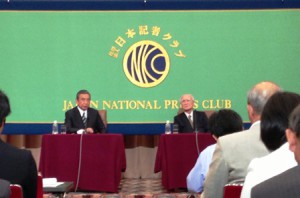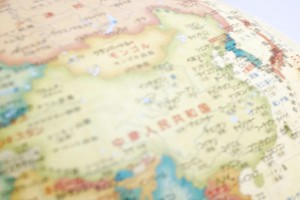Evaluation of the Abe Government Remains Inconsistent / Sankei Shimbun Seoul Bureau Chief’s Travel Ban
post date : 2015.06.09
Monthly Magazines Covered This Month
Seiron, Sekai, Chuokoron, Bungeishunju (June issues)
Vol. 2, June 2015
1. Evaluation of the Abe Government Remains Inconsistent
2. Sankei Shimbun Seoul Bureau Chief’s Travel Ban
1. Evaluation of the Abe Government Remains Inconsistent
◆ “Japan’s Historical Perspectives and the Future of Asian Diplomacy”
Former Prime Minister Tomiichi Murayama×Former Chief Cabinet Secretary Yohei Kono, Sekai
◆ “Suggestion from a Historian for the Abe Statement”, Masayuki Yamauchi, Bungeishunju
◆ “Abenomics: Responding to Criticisms of the Third Year”, Koichi Hamada, Bungeishunju
◆ “Akie Abe: New First Lady Declaration”, Akie Abe, Bungeishunju
 ■The Murayama Statement and Kono Statement, Back in the Spotlight
■The Murayama Statement and Kono Statement, Back in the Spotlight
Since the second Abe government began in 2012, the Japanese media’s interest has been focused on basically one topic. Not on the economy, territorial disputes, or ideological differences, but on the Abe government itself.
The biggest topic for the Abe government this year is the 70th anniversary of the end of World War II. With the statement on the 70th anniversary of the war to be released in August, the historical perspective of the government and Abe himself appear to be becoming political issues. In fact, one point has been focused on to the exclusion of all else: how Abe will uphold both the Murayama Statement (1995) on the 50th anniversary of the war, which expressed “deep remorse” over colonial rule and aggression, and the Kono Statement (1993), which admitted to and apologized for Japanese military at the time being involved with “comfort women”. Sekai carried a conversation between former Prime Minister Tomiichi Murayama and former Chief Cabinet Secretary Yohei Kono, titled “Japan’s Historical Perspectives and the Future of Asian Diplomacy”.
Mr. Murayama, who as the head of the Japanese Socialist Party became prime minister of a coalition government, speaks of his concerns, saying “Honestly, I didn’t think a statement released 20 years ago would return to the spotlight again like this. ...It is because international society is concerned and interested in the Japanese government’s historical perception that my statement on the 50th anniversary of the war has become the focus of attention again, so it is not the kind of attention to be happy about.”
Regarding the current state of diplomacy with Asia, his analysis is “...was the war an invasion of Asia by Japan, or a defensive war that could not be avoided? With some people even glorifying it as ‘a war to liberate colonies’, the government’s historical perception remains inconsistent, and if you try to teach that the war was wrong then some people will claim that perception is ‘biased’. The Chinese and South Korean governments have done their research and are aware of this situation, causing them to be concerned, which then feeds back into the public perception in Japan.” He insists that the government’s inconsistent position is why the issues with China and Korea remain.
Mr. Kono, who released a statement as Chief Cabinet Secretary, said about the Kono Statement that “...I never thought I would be discussing it as a current issue 20 years later.” Discussing writing the statement, he said “It is a fact that the military at the time placed many women in terrible situations in which their honor and dignity were ignored,” and also “No solid proof exists showing that the Japanese government was directly involved in recruiting comfort women against their will,” and so the statement was written “honestly, based on all the facts available at the time.” But now, instead of the women’s rights and dignity being restored, which should be the main goal, the debate is focusing exclusively on exactly how the women were gathered. “This debate implies that if the government and army weren’t directly involved in recruiting women against their will, then there is no problem. Hearing this from people in significant positions in both the governing and opposition parties is truly unfortunate”. He points out that the position taken regarding the problem is in itself contrary to international society’s values regarding human rights.
In response to a comment from the Sekai editorial staff that almost no one in the Diet now experienced the war personally, Mr. Kono said “It is true that politicians who remembered the war felt at least some degree of remorse about it,” and he mentioned that the importance of education increases as the number of young people that have not experienced war increases. When he took the post in 2007, Shinzo Abe became the first prime minister to have been born after the war. On the 70th anniversary of the war, the generational disparity in worldviews and interests may have led to this conflict over historical perception—the battleground of the older generation—without regard for the usual differences separating the governing and opposition parties or left and right wing politics. (Photo: The press conference with Mr. Murayama and Mr.Kono at the Japan National Press Club on June 9th)
■ Apologies Won’t Solve Historical Issues
What is the proper way to deal with history? Bungeishunju ran an article titled “Suggestion from a Historian for the Abe Statement”, written by Masayuki Yamauchi, a historian and member of the Advisory Panel on the History of the 20th Century and on Japan’s Role and the World Order in the 21st Century. He describes historical perceptions in China and South Korea, two countries with which historical issues are diplomatic problems with Japan.
Mr. Yamauchi states that, in China and South Korea, “There is a tendency to think of historical interpretations as classical morals, teaching people how to act.” Specifically, he explains that “The issue with military comfort women and the truth and lies surrounding the Nanjing Massacre is that, regardless of whether or not the involvement of the Imperial Japanese government or Army at the time is historical fact, or whether the actual number and type of casualties can be proven, as long as there is some evidence to allow those possibilities to be imagined, then some people believe history can be created based on their sense of duty.” He explains that this way of thinking comes with the assumption that “...historical perceptions based on emotions and a sense of justice are prioritized over historical fact,” and that “Political decisions and methods to use history effectively in diplomacy do not allow for free historical research, which should have diverse opinions and discrepancies in evidence.”
Speaking on how history is perceived, Mr. Yamauchi said “The issue of historical perceptions, as can be seen with Japan, China and Korea, is not just an issue involving the past. More so than the past, it is an issue of the people living in each time period, and reflects the situation of that time in a complex fashion. For instance, with the Nanjing Massacre as an example, he explains “The reason a specific event continues to be remembered and criticized is not because of a lack of remorse on the part of the aggressor, but because the spotlight of modern historical perception is presenting a different angle of the event. When the government changes, the part lit by the spotlight is focused on even more, and other parts that hadn’t been lit up previously are also added as new issues.” As this continues, “Instead of focusing on humble research the facts of history, the issues changes to whether Japan will accept a mechanism for constant diplomatic concessions by creating eternal responsibility as an ‘aggressor’.”
 Considering then how apologies and remorse “involve difficult issues,” Mr. Yamauchi praised Abe’s speech at the 60th Anniversary Asian African Conference (Bandung Conference) held in Indonesia in late April. The speech described Japan’s current policy as following the 10 principles of peace of the Bandung Conference. Mr. Yamauchi said the speech can be considered to have “...indicated the intention to uphold previous statements showing remorse for aggression,” and “In particular, many of the heads of Southeast Asian countries appreciated the forward-looking aspect and the constructive historical perception that focused on results so far and future intent more than on apologizing.” He gave his opinion that “If this is going to form the base of the statement (on the 70th anniversary of the war), then I believe it is heading in the right direction.”
Considering then how apologies and remorse “involve difficult issues,” Mr. Yamauchi praised Abe’s speech at the 60th Anniversary Asian African Conference (Bandung Conference) held in Indonesia in late April. The speech described Japan’s current policy as following the 10 principles of peace of the Bandung Conference. Mr. Yamauchi said the speech can be considered to have “...indicated the intention to uphold previous statements showing remorse for aggression,” and “In particular, many of the heads of Southeast Asian countries appreciated the forward-looking aspect and the constructive historical perception that focused on results so far and future intent more than on apologizing.” He gave his opinion that “If this is going to form the base of the statement (on the 70th anniversary of the war), then I believe it is heading in the right direction.”
The Japanese media has been focusing almost exclusively on historical and security issues recently, but the interest of Japanese citizens remains focused on the economy, as always. An adviser to the Abe government, economist Koichi Hamada, explains the current state of the Abenomics economic policy in his article “Abenomics: Responding to Criticisms of the Third Year” in Bungeishunju.
Mr. Hamada mentions the decrease in unemployment and increase in overall wages, and says that the original goal is being approached. “The creation of demand is going well.” He also explains reasons for the criticism that the average Japanese citizen isn’t feeling the effects of Abenomics.
First, as the reason that the goal of 2% inflation hasn’t been reached, he mentions the unexpected long-term drop in the price of crude oil. He also provides his analysis of the situation of why wage increases and economic recovery is not yet noticeable as “There are still extra people in companies, particularly in SMEs,” and says that eliminating extra personnel will improve profitability and lead to wages increasing. On the topic of the slump in regional economies, he points out a similar excess of labor, and indicates his opinion that a decrease in corporate taxes to bring in domestic and foreign investment could be “the greatest weapon available to protect regional economies from decline.”
Regarding the growth strategy, the “third arrow” of Abenomics which is critical for the growing the Japanese economy, Mr. Hamada said that regulation reforms are critically important, in addition to the TPP and encouraging employment opportunities for women,. He also said that in order to demolish old government and corporate systems and move forward with reforms, further “political leadership” is necessary.
■ The Politician’s Wife of a New Era?
Prime Minister Shinzo Abe has presented his ideological position clearly, receiving strong support from Japanese conservatives and traditionalists. However, by running an izakaya (Japanese pub) and posting frequent SNS updates about her activities, his wife Ms. Akie Abe has garnered attention for acting outside the bounds of a traditional Japanese politician’s wife that supports her husband from out of sight. She provides a look behind the scenes of her life as the prime minister’s wife in “Akie Abe: New First Lady Declaration” in Bungeishunju.
On the topic of how she sometimes publicly states opinions that differ from the prime minister on topics such as nuclear power and constitutional reform, Ms. Akie explains “When I think my husband’s position is wrong, I make sure to tell him directly ‘I don’t agree.’ Some people have described me as a ‘domestic opposition party,’ but I don’t want to act in a specific way just because people think that is how a politician’s wife or first lady should act...Since my husband is representing not just the Liberal Democratic Party, but all of Japan, I want to make sure I tell him ‘There are also people with these kinds of opinions’.”
Speaking on one of the prime minister’s banner policies, the encouragement of women’s participation in the workforce, she presented her own analysis of her husband: “...since my husband has always been conservative in his opinions, he may still not believe that all women should work. ...however, he definitely does believe that we need to create an environment where it is easy for those people who want to work to be able to. That is why he also shows a lot of understanding towards what I do...or at least he pretends to, there’s no way to be sure!” Ms. Akie has also noticed the times are changing, saying “Maybe it is because he is more understanding of women’s participation in the workforce now, but compared to the last time my husband was prime minister, I think he is more willing to accept me acting independently.”
2. Sankei Shimbun Seoul Bureau Chief’s Travel Ban
◆”Returning from South Korea, After an Eight-Month Travel Ban”, Tatsuya Kato, Seiron
Friction between the Abe government and the mass media has continued ever since the issue of the Asahi Shimbun’s inaccurate reports on “comfort women,” with claims of pressure by the Cabinet on TV stations also surfacing and tensions rising even higher as the international press becomes involved as well. A different clash between the authorities and Japanese media also occurred in South Korea. In October last year, Korean prosecutors charged Mr. Tatsuya Kato, the Sankei Shimbun Seoul Bureau Chief at the time, with defaming President Park Geun-hye. He was also placed under a travel ban, and house arrest. The travel ban was finally lifted in April.
Seiron ran Mr. Kato’s article “Returning Home from South Korea, After an Eight-Month Travel Ban”. Mr. Kato said “This incident made me feel strongly that it is difficult for Japan to share the same values as South Korea—extremely difficult, I would even go so far as to say impossible. Facing criminal liability for writing an article in Japanese, as a journalist from Japan. This is unthinkable not just in Japan, but in any liberal society...I can’t help but shake my head at South Korea’s government that acts based on assumptions of the president’s intentions, interests, and moods.”
Regarding anti-Japanese sentiment in South Korea, he writes “I would like to emphasize that not everyone has an entrenched hatred of Japan,” and provides his analysis that “the social fabric allows” for acts such as when eggs were thrown at the vehicle he was in. He also stated that for this case, “Even if someone thought the South Korean government’s actions were excessive, if they said so then they would be accused of being a ‘Japan sympathizer’. This kind of hesitation is also present in the news media.”
Mr. Kato mentioned he will continue to cover South Korea when the need arises, writing “I would like to continue to observe South Korea, a country that despite being a neighbor to Japan cannot share the same values.” It will be interesting to see what kind of articles he writes in the future.
*This page was created independently by Foreign Press Center Japan, and does not reflect the opinion of the Japanese government or any other organization.




